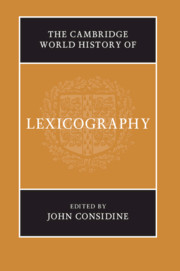Book contents
- The Cambridge World History of Lexicography
- The Cambridge World History of Lexicography
- Copyright page
- Contents
- Contributors
- Editor’s Acknowledgements
- Introduction
- Part I The Ancient World
- Part II The Pre-Modern World
- Part III The Modern World: Continuing Traditions
- Part IV The Modern World: Missionary and Subsequent Traditions
- 26 Missionary Traditions in South America
- 27 Missionary Traditions in Mesoamerica
- 28 Missionary and Subsequent Traditions in North America
- 29 Missionary Traditions in East Asia
- 30 European Traditions in India and Indonesia
- 31 Missionary and Subsequent Traditions in Africa
- 32 Missionary and Other Traditions in Australia
- Appendix 1 The Language Varieties
- Appendix 2 The Lexicographers
- Primary Sources
- Secondary Sources
- Index
31 - Missionary and Subsequent Traditions in Africa
from Part IV - The Modern World: Missionary and Subsequent Traditions
Published online by Cambridge University Press: 01 September 2019
- The Cambridge World History of Lexicography
- The Cambridge World History of Lexicography
- Copyright page
- Contents
- Contributors
- Editor’s Acknowledgements
- Introduction
- Part I The Ancient World
- Part II The Pre-Modern World
- Part III The Modern World: Continuing Traditions
- Part IV The Modern World: Missionary and Subsequent Traditions
- 26 Missionary Traditions in South America
- 27 Missionary Traditions in Mesoamerica
- 28 Missionary and Subsequent Traditions in North America
- 29 Missionary Traditions in East Asia
- 30 European Traditions in India and Indonesia
- 31 Missionary and Subsequent Traditions in Africa
- 32 Missionary and Other Traditions in Australia
- Appendix 1 The Language Varieties
- Appendix 2 The Lexicographers
- Primary Sources
- Secondary Sources
- Index
Summary
According to the latest calculation of Ethnologue, the African continent has more than 2,000 languages. The lexicography of this vast body of languages until the nineteenth century was very modest. Their codification in grammars and dictionaries increased dramatically after the Berlin Conference of 1884–5 formalized the process of the European colonization of Africa, and the history of linguistics of the African languages became a subject of scholarly attention in the twentieth century. Apart from the establishment of the Xhosa Dictionary Project in 1968, only in the last decade of the twentieth century were there considerable developments in African lexicography: in 1991 the journal Lexikos – the only journal in Africa devoted to lexicography – was launched; in 1992, the African Language Lexical Project (ALLEX) was formed (between the Universities of Oslo and Zimbabwe); in 1995, the African Association for Lexicography (AFRILEX) was founded, with Lexikos as its official journal from 1996; and, in 2000, the African Languages Research Institute (ALRI) of the University of Zimbabwe was established.
- Type
- Chapter
- Information
- The Cambridge World History of Lexicography , pp. 658 - 681Publisher: Cambridge University PressPrint publication year: 2019
- 1
- Cited by



